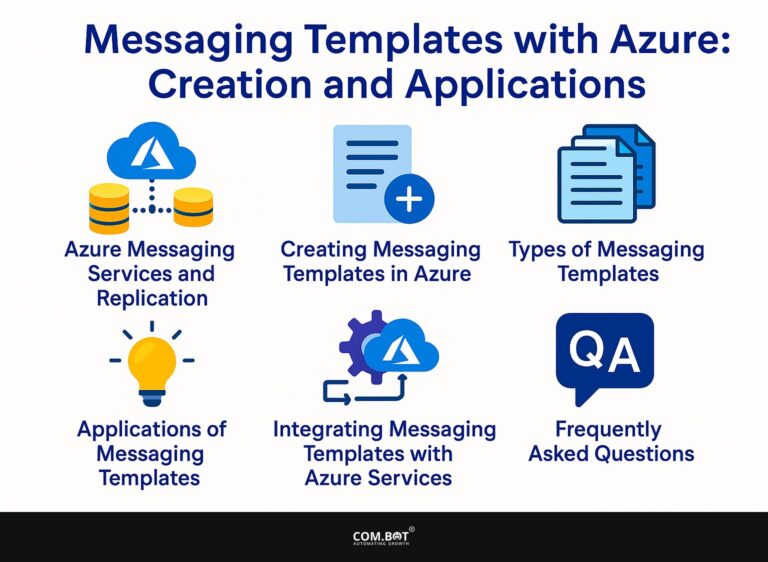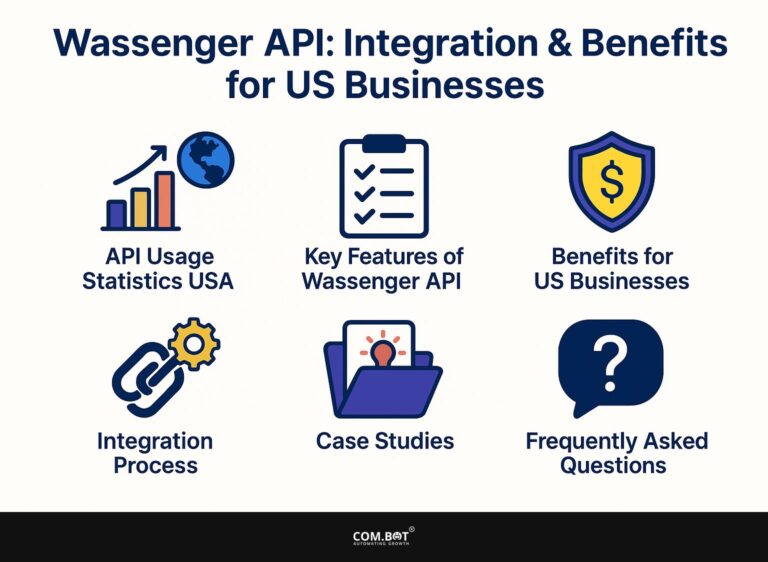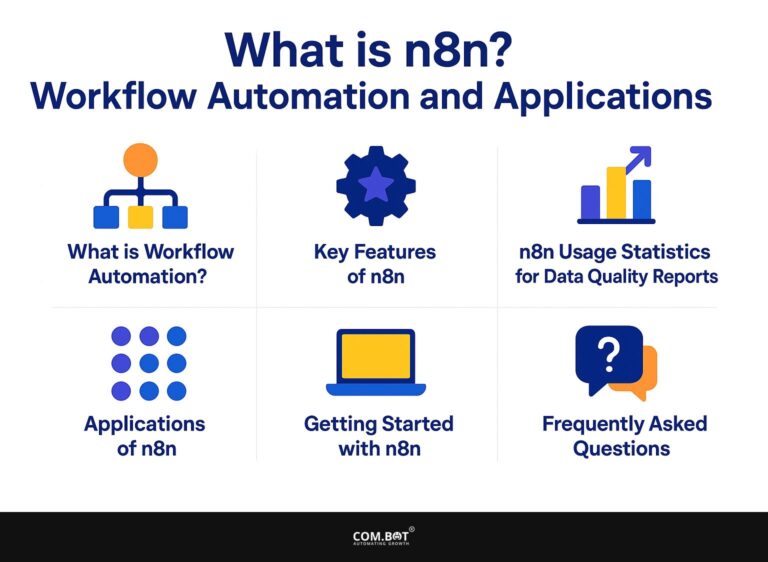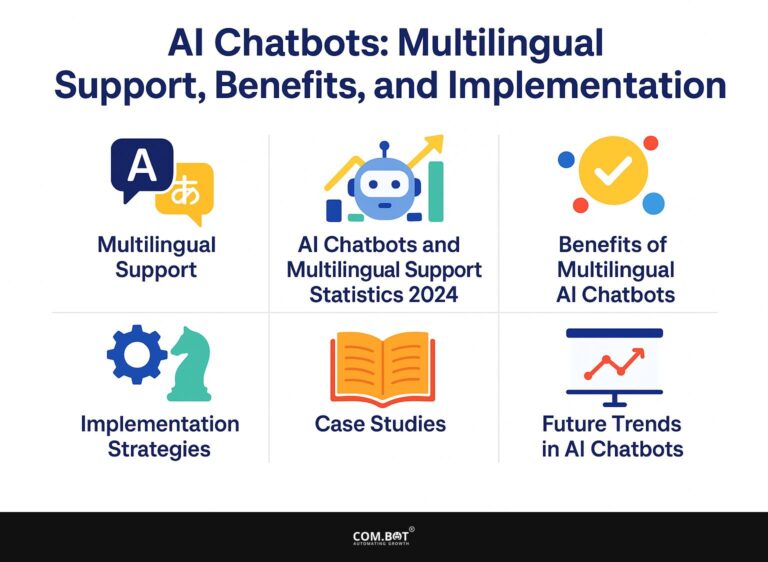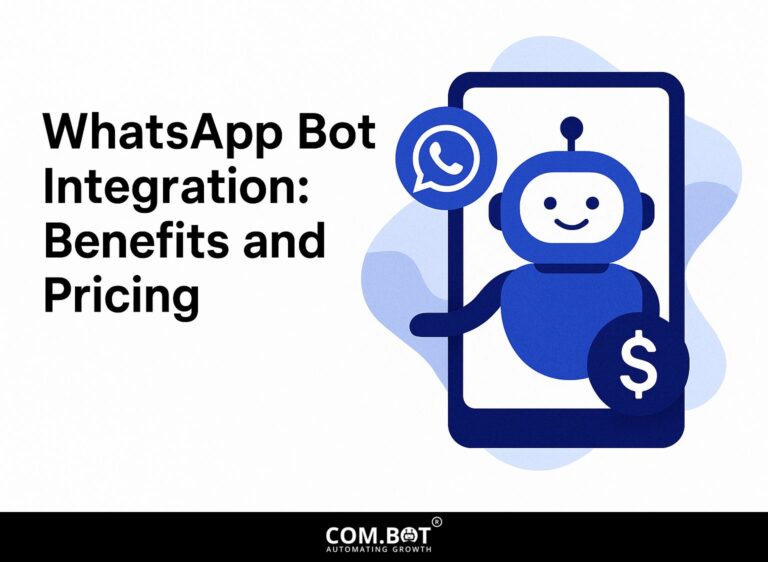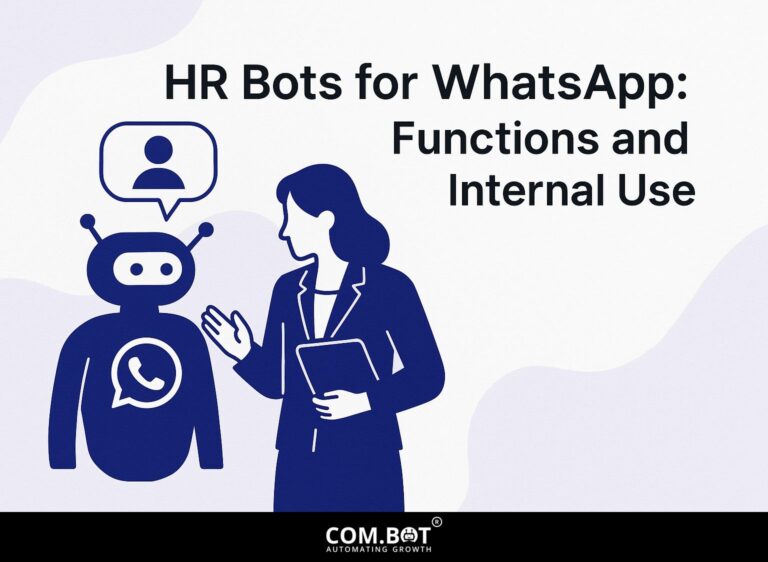WhatsApp API Integration: AI, CRM, and Automation Guide
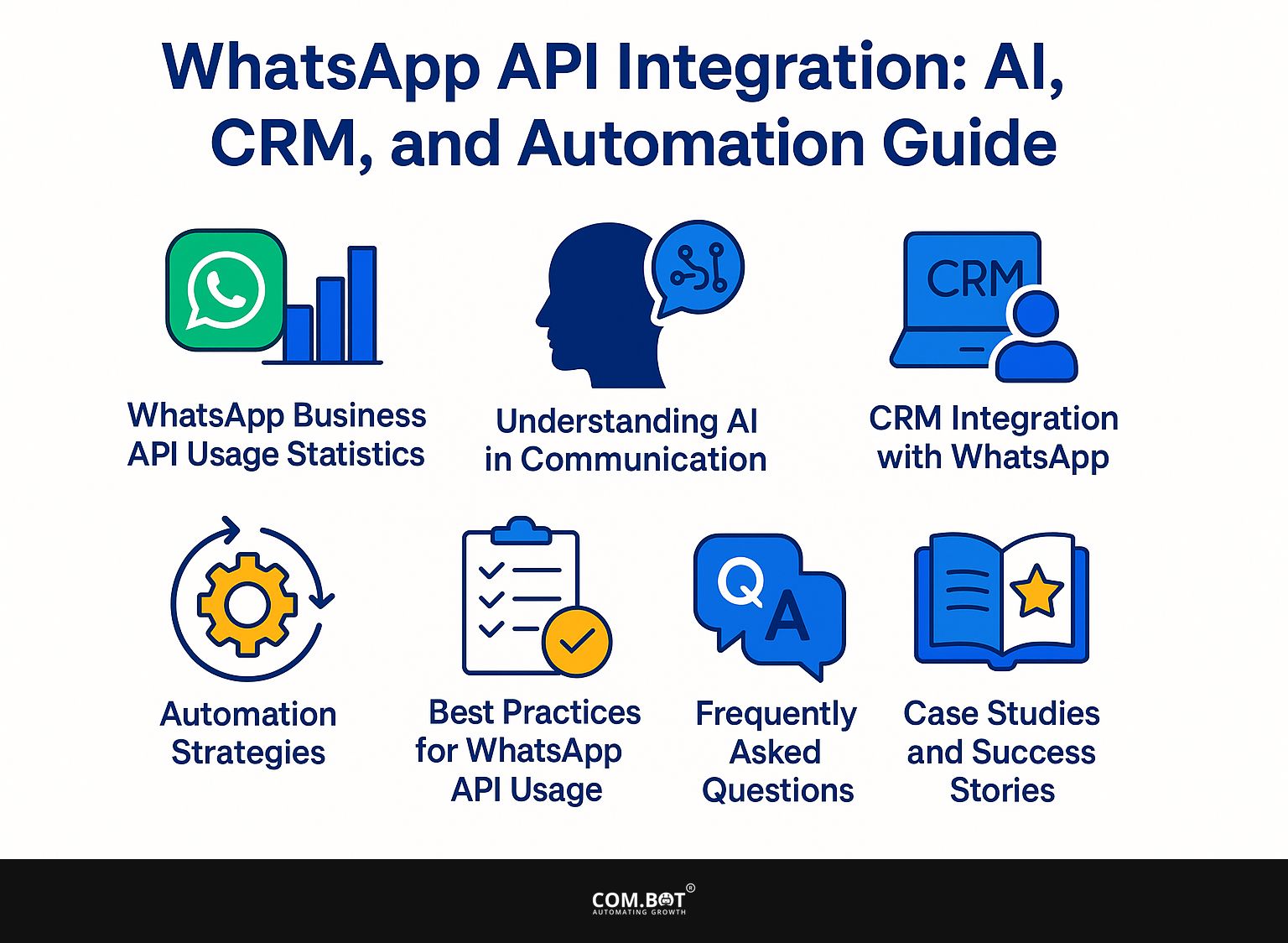
Use WhatsApp CRM integration to improve how you connect with customers! In this guide, we will explain how to easily link WhatsApp with Customer Relationship Management systems and use AI tools like AiSensy for personalized communication.
Learn practical ways to improve communication, make processes simpler, and build stronger bonds with your audience. Improve your customer communication and increase your business success with seamless WhatsApp API integration.
Key Takeaways:
- Using WhatsApp API in business communication offers advantages like better customer interaction, smoother workflows, and higher efficiency.
- AI plays a key role in making customer communication better on WhatsApp. Tools like chatbots and voice assistants help create personalized and clear interactions.
- Integrating CRM with WhatsApp allows for seamless management of customer data, improved targeting, and better customer service, increasing overall customer satisfaction and retention.
- 1 WhatsApp Business API Usage Statistics
- 2 Understanding AI in Communication
- 3 CRM Integration with WhatsApp
- 4 Automation Strategies
- 5 Best Practices for WhatsApp API Usage
- 6 Frequently Asked Questions
- 6.1 1. What is WhatsApp API integration?
- 6.2 2. How can AI be integrated with WhatsApp API?
- 6.3 3. What is the role of CRM in WhatsApp API integration?
- 6.4 4. What are the benefits of WhatsApp API integration?
- 6.5 5. Can any business use WhatsApp API integration?
- 6.6 6. How can a business get started with WhatsApp API integration?
1. What is WhatsApp API?
The WhatsApp API is a cloud-based service that allows businesses to send and receive messages, facilitating real-time communication with customers.
This API allows businesses to manage customer questions easily, send automatic updates, and work smoothly with current systems like CRMs.
For example, businesses can set up automatic responses for common questions, helping customers reach support more easily. The API allows you to use message templates for notifications such as shipping updates or appointment alerts, which keep customers interested.
It’s important to get clear permission from customers before starting any communication to follow data protection laws, which helps build trust and openness in conversations.
2. Benefits of Using WhatsApp API
Using the WhatsApp API can increase customer interaction by 60% and make communication easier, providing an affordable option for businesses.
By implementing the WhatsApp API, companies like Uber and Airbnb have significantly improved their customer support. For example, using automatic responses, businesses can cut reply times by up to 80%, ensuring customer questions are addressed quickly.
To get started, consider integrating tools like Twilio for sending messages or Zendesk for managing support requests. Both tools provide easy-to-use APIs and detailed documentation, allowing you to customize the integration to suit your business needs and improve how users interact with your system. Worth exploring: WhatsApp API Setup: Components and Benefits for an in-depth overview of the technical aspects and advantages.
WhatsApp Business API Usage Statistics
WhatsApp Business API Usage Statistics
WhatsApp Business Marketing Impact: User Engagement and Reach
WhatsApp Business Marketing Impact: Business Adoption and Usage
WhatsApp Business Marketing Impact: Regional Penetration
WhatsApp Business Marketing Impact: Marketing and Sales Impact
The WhatsApp Business API Usage Statistics gives important information about how the platform affects business communication, user involvement, and growth in various areas, showing how well it improves business activities globally. With WhatsApp Business Marketing Impact, the platform boasts a staggering 2.5 billion global users, demonstrating its extensive reach. The 98% open rate for messages highlights the platform’s dependability for direct communications, making sure messages are viewed and interacted with. A vast 100 billion daily messages indicate active user engagement across 180 countries and in 60 languages, highlighting the platform’s ability to work worldwide and support for multiple languages.
- Business Adoption and Usage: WhatsApp’s API is utilized by 5 million businesses, with 90% of messages sent through this channel, showing its important role in business communications. The platform has improved customer satisfaction by 70%, highlighting its efficacy in enhancing customer experiences. Predictions of $3.6 billion spending on WhatsApp by 2025 illustrate the anticipated growth and investment in this business tool.
- Regional Penetration: In Brazil, 98.9% of users use WhatsApp, showing its wide use in the area. Similarly, India boasts 487 million users, signifying substantial adoption, while the UK sees a 71.3% penetration rate, showcasing its popularity in diverse markets.
Regarding Marketing and Sales Impact, WhatsApp has increased sales for online businesses by 45%, with a notable 25% reduction in cart abandonment rates. This indicates the platform’s effectiveness in facilitating transactions and retaining customers. Improved customer engagement, at 45%, and its status as a preferred communication method by 50% of users highlight its significant role in consumer-business interactions. These numbers show how the WhatsApp Business API has changed the way companies around the world communicate, connect with customers, and plan sales.
Understanding AI in Communication
Artificial Intelligence is making customer communication better by offering customized replies and handling repetitive tasks, making interactions faster.
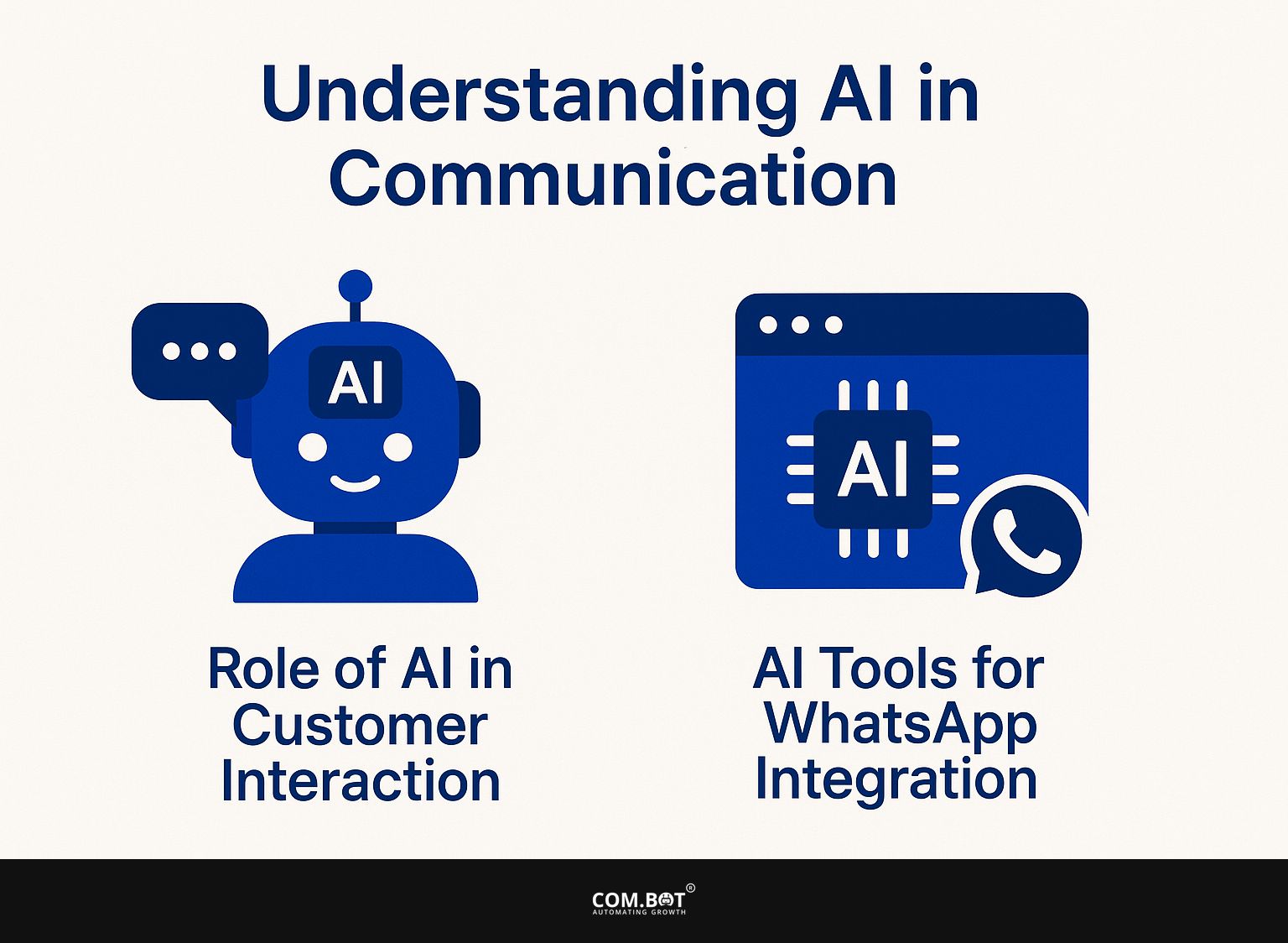
1. Role of AI in Customer Interaction
AI-driven chatbots can handle up to 80% of customer inquiries, freeing up human resources for more complex interactions. These chatbots analyze customer behavior through past interactions, allowing them to predict questions and provide answers proactively.
For instance, Sephora’s chatbot recommends beauty products based on user preferences, enhancing engagement. Similarly, Hootsuite employs an AI chatbot that can resolve common issues instantly, significantly reducing response time.
Companies like Zendesk and Intercom provide strong platforms for setting up chatbots quickly, with custom scripts and around-the-clock support. Using these AI solutions makes customers happier and reduces the workload for human agents, resulting in a smoother service process.
2. AI Tools for WhatsApp Integration
Popular AI tools such as Dialogflow and Twilio can be seamlessly integrated with WhatsApp to create sophisticated customer management systems.
Dialogflow offers a free version that is good at handling and recognizing human language, making it useful for dealing with customer questions.
Twilio, with a pay-as-you-go model at $0.0075 per message, allows for SMS and voice capabilities, suitable for interactive campaigns. AiSensy offers specialized tools for online shops, making order tracking easier and assisting customers.
Businesses can significantly enhance their customer interactions by using these tools, offering personalized experiences and straightforward communication methods.
CRM Integration with WhatsApp
Linking WhatsApp with a CRM system helps businesses keep all customer communications in one place and greatly improve how they handle potential customers.
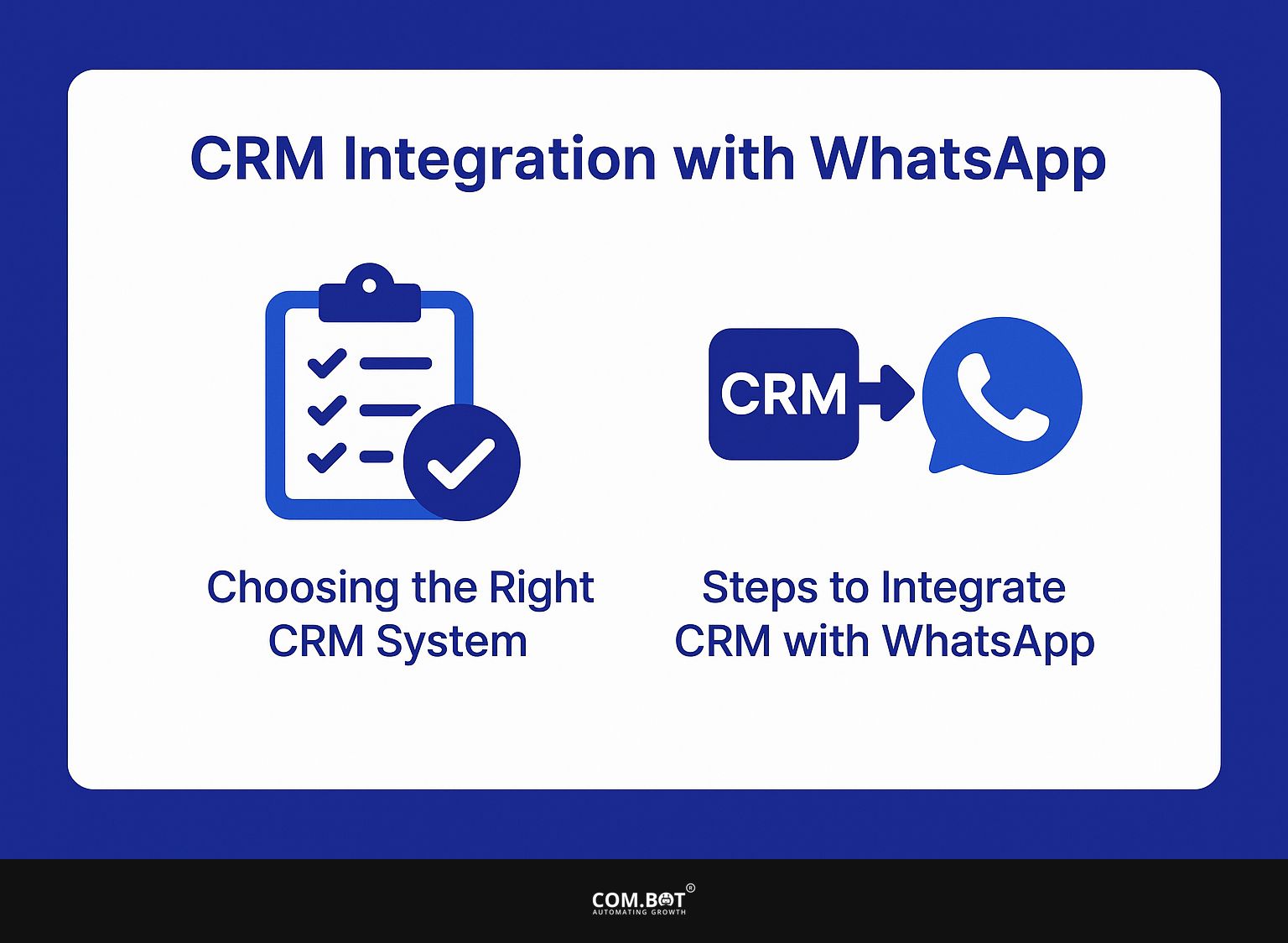
1. Choosing the Right CRM System
Choosing the right CRM is important; widely-used options like HubSpot, Salesforce, and Zoho have strong WhatsApp integration features. When choosing a CRM, consider your business size and specific needs.
HubSpot is an excellent starting point for marketing automation, offering a free tier and premium options up to $50 per month. Salesforce, beginning at $25 per user/month, provides extensive business solutions, which might be more than necessary for smaller businesses.
Zoho, starting at $12 per user each month, is made for small businesses with limited budgets, offering necessary features without extra costs. Weigh these factors carefully to align your CRM choice with your business goals.
2. Steps to Integrate CRM with WhatsApp
Integrating your CRM with WhatsApp requires a clear process:
- Choose a CRM that supports WhatsApp,
- Obtain WhatsApp Business API access,
- Configure API settings,
- Test the integration.
To choose a compatible CRM, consider options like HubSpot, Salesforce, or Zoho CRM, as they all offer built-in WhatsApp integration. Once you have the WhatsApp Business API, make sure to check your business account correctly, which can take about one to two days.
For configuration, you’ll need to input the API credentials into your CRM’s settings, usually found under integrations. Contact your team to check that all tasks are going smoothly. Address common pitfalls, such as API rate limits, by monitoring usage closely after launch.
Automation Strategies
Using automated processes in WhatsApp CRM integrations can reduce operating costs and increase customer satisfaction by making interactions quicker and simpler. If you’re looking to dive deeper into this, consider our comprehensive WhatsApp API Integration: AI, CRM, and Automation Guide to enhance your understanding of how automation can transform these processes.
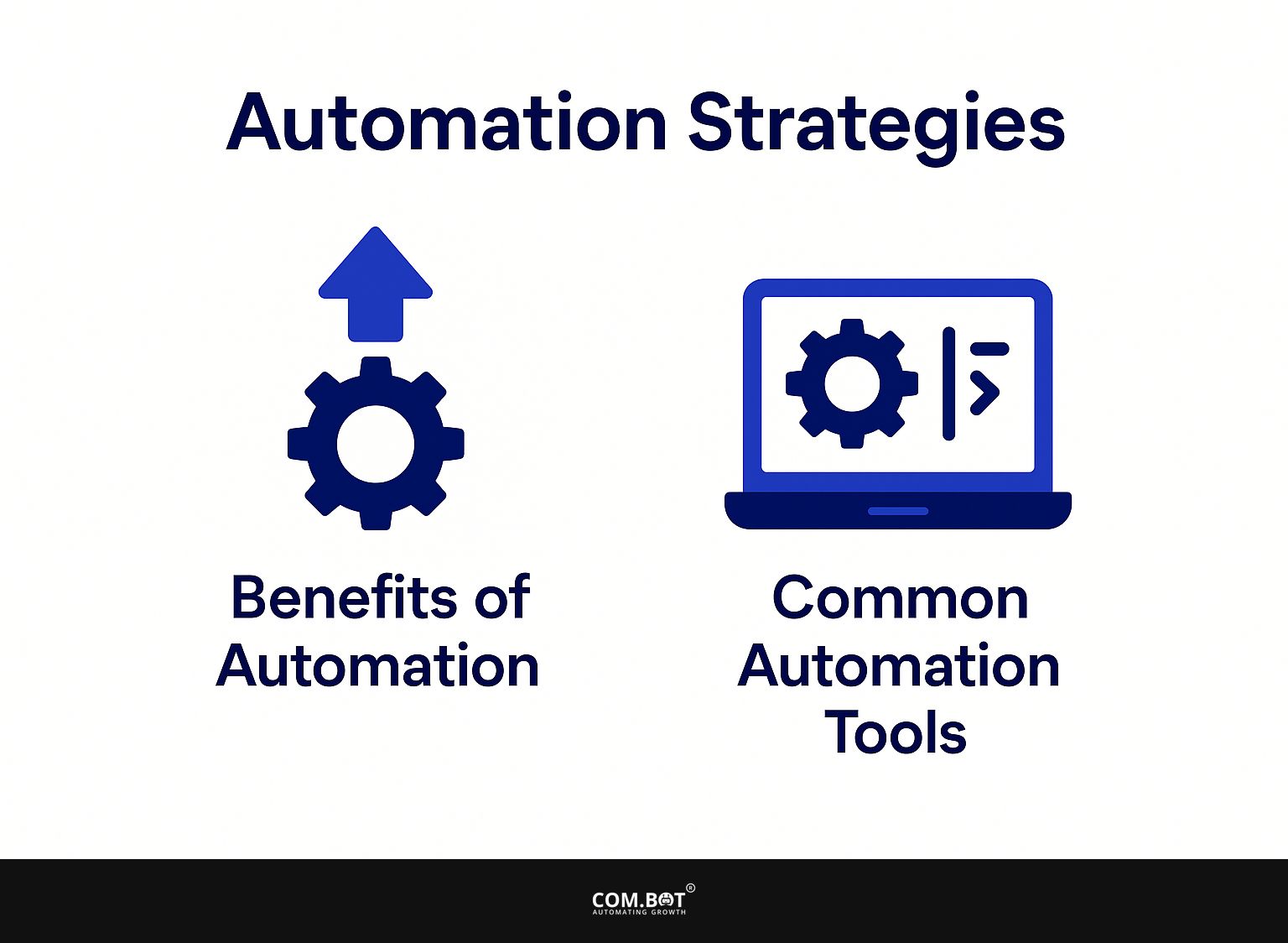
1. Benefits of Automation
Implementing automation can reduce manual processing time by up to 70%, allowing teams to focus on high-value tasks.
For example, tools like Zapier can help with repetitive tasks such as entering data or sending email alerts between apps. By creating automatic workflows, teams can reduce response times from hours to minutes.
HubSpot’s marketing tools can increase follow-up rates by up to 40%, helping manage leads automatically. Companies like Buffer and Trello have reported significant increases in productivity and customer satisfaction after adopting such automation strategies. Investing a few hours in setup can yield quick, measurable improvements in operational efficiency.
2. Common Automation Tools
Tools like Zapier and ManyChat can make it much easier to set up automatic WhatsApp responses, streamlining how you handle customer conversations. To make communication easier, try using Zapier, ManyChat, and the WhatsApp Business API together.
Zapier, starting at $19.99/month, lets you set up workflows that send a message to your team on Slack when a customer contacts you on WhatsApp. ManyChat provides a free plan that lets you create automatic replies and scheduled messages to follow up with potential customers.
The WhatsApp Business API provides advanced features like customer segmentation but has variable pricing based on usage. Choosing the right tool depends on your specific needs, scalability, and budget.
Best Practices for WhatsApp API Usage
Using recommended methods for the WhatsApp API helps follow rules and increase customer interaction and happiness.
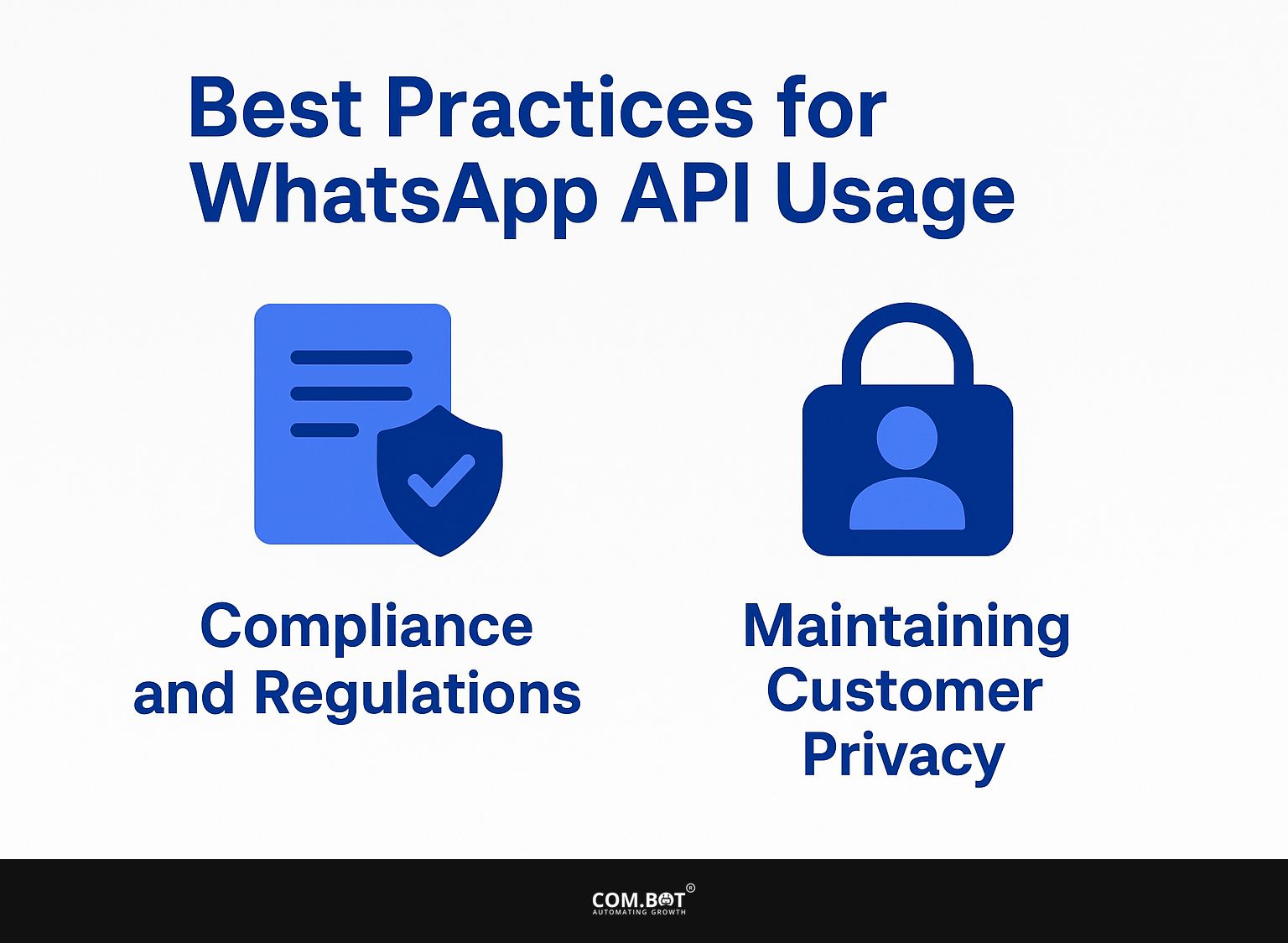
1. Compliance and Regulations
Following data protection rules like GDPR is important when using the WhatsApp API to avoid large penalties. To follow regulations, first get clear permission from users before starting messaging campaigns.
Provide transparent communication about how their data will be used. Use encrypted messaging services to protect sensitive information.
A checklist for compliance includes:
- Obtain explicit consent through opt-in forms.
- Clearly state the purpose of data collection.
- Implement data protection measures like encryption.
- Regularly update privacy policies.
- Offer users an easy way to withdraw consent.
Following these steps can safeguard your business against legal issues and maintain customer trust.
2. Maintaining Customer Privacy
Maintaining customer privacy is essential; businesses should regularly review their privacy policies and data handling practices.
To manage data well, companies should regularly check how they store and share data. This includes verifying that personal data is encrypted and access is limited to authorized personnel only.
Businesses should establish transparent communication with customers regarding their data usage, such as notifying them about data collection methods and storage locations. Regularly updating privacy policies to reflect new regulations can further build trust. Tools like OneTrust or TrustArc can aid in managing compliance and tracking changes effectively.
Frequently Asked Questions
1. What is WhatsApp API integration?
WhatsApp API integration is the process of connecting your business’s existing systems and tools with the WhatsApp messaging platform. This makes it easy for your business to talk to customers and set up automatic responses on WhatsApp.
2. How can AI be integrated with WhatsApp API?
AI, or artificial intelligence, can be used with the WhatsApp API to improve automation and customer service. This can include features like chatbots and natural language processing to automatically respond and customize interactions with customers.
3. What is the role of CRM in WhatsApp API integration?
CRM, or customer relationship management, is important for WhatsApp API integration by handling and arranging customer information. This data can then be used to tailor interactions and improve customer service through the WhatsApp messaging platform.
4. What are the benefits of WhatsApp API integration?
Some main benefits of using WhatsApp API are improved speed, easier communication, better customer service, and the chance to connect with more people through this popular messaging app. It also allows for automation and personalization of interactions with customers.
5. Can any business use WhatsApp API integration?
Yes, any business can use WhatsApp API integration to improve their communication and customer service. You need to follow some rules and recommendations to use the messaging platform for business.
6. How can a business get started with WhatsApp API integration?
A business can get started with WhatsApp API integration by working with a certified WhatsApp Business Solution Provider. They will be able to guide the business through the integration process and provide support and resources for utilizing the messaging platform effectively.
